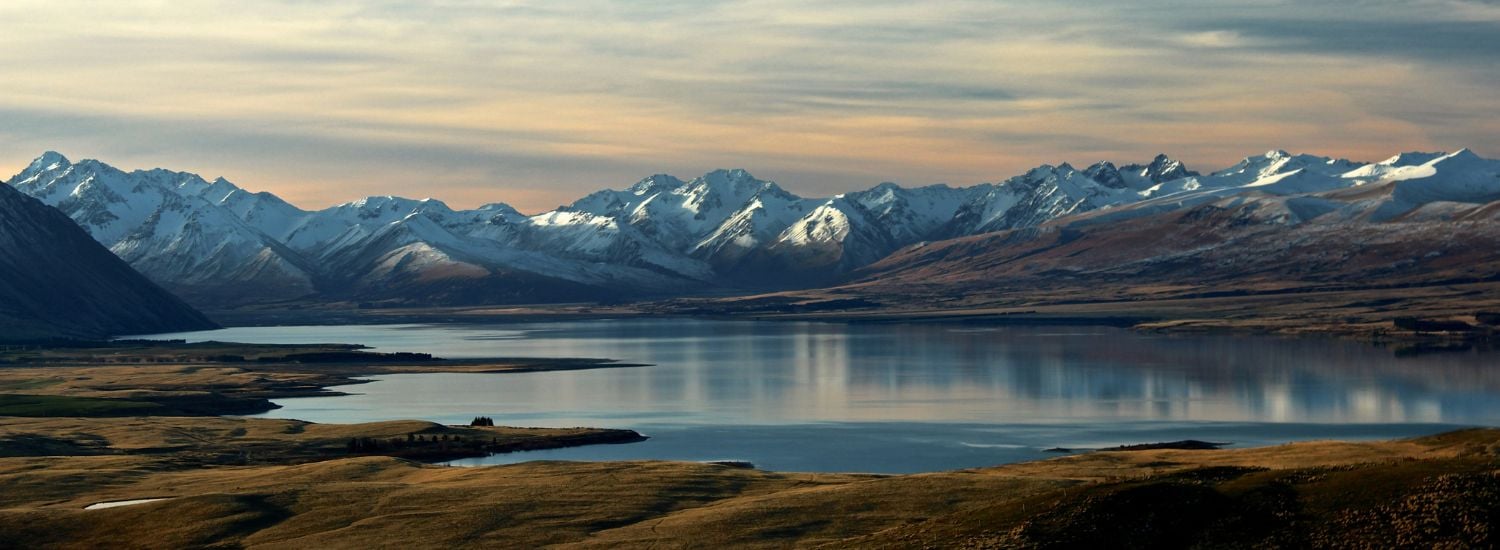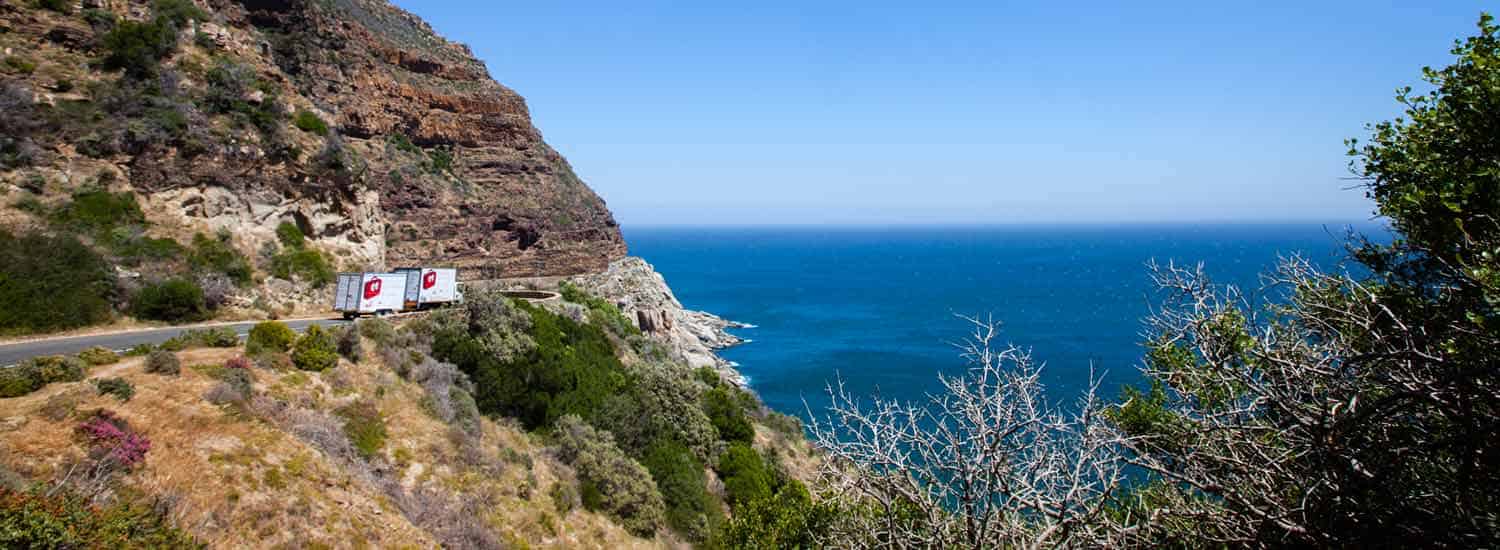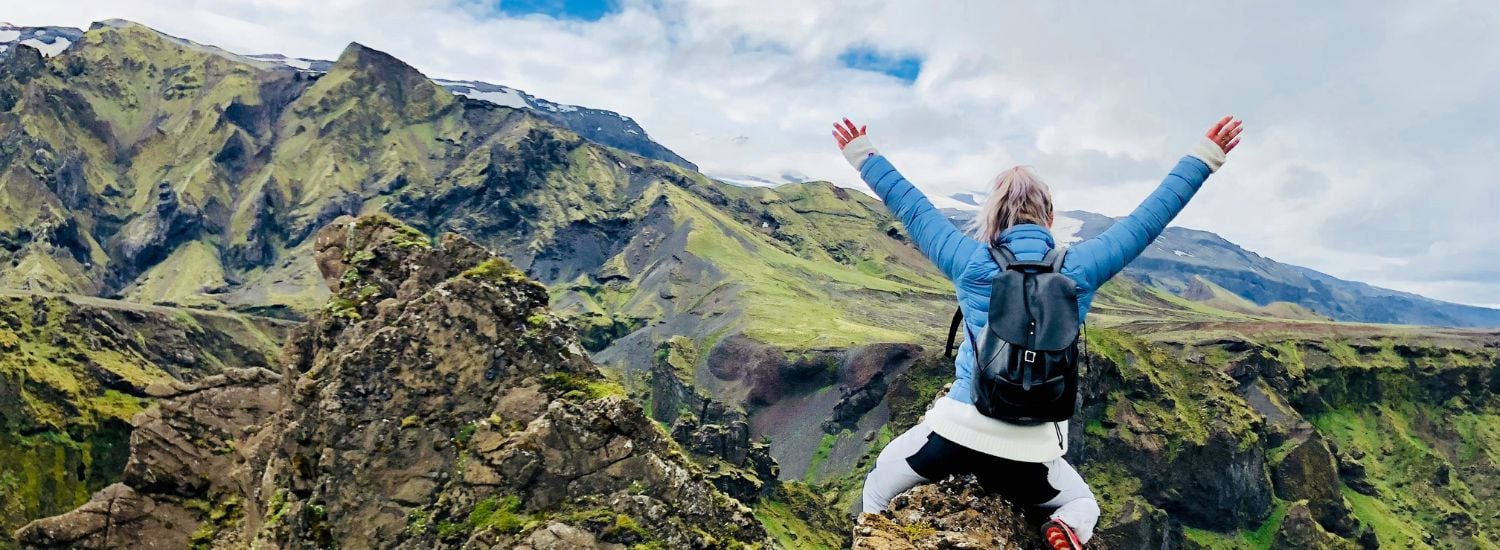Before packing, check this list of items prohibited from entering a particular country or region.

Things to know before moving to New Zealand
Moving to New Zealand promises an exciting mix of stunning landscapes, welcoming communities and a laid-back lifestyle. With its breathtaking coastlines, rugged mountains, strong economy and excellent education, the Land of the Kiwis delivers a blend of outdoor adventure and modern living.
The Kiwi Nation is home to around 5.33 million people and growing, driven by foreign workers and expats. Our relocating to New Zealand guide covers the visa process, renting vs buying, the cost of living, job opportunities and much more.
Is New Zealand a good place to live?
New Zealand is a good place to live due to its high living standards. Citizens enjoy stunning natural environments with beaches, mountains and lush forests. Plus, outstanding education standards, forward-thinking environmental policies and a strong focus on work-life balance. With universal healthcare and a dynamic arts, film and outdoor culture, you'll never want to leave!
Must-know information about living in New Zealand
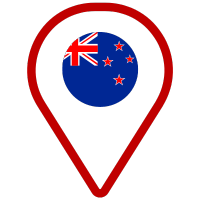
2026 quick facts about New Zealand
| Main islands | 2 |
| Small islands | 200+ |
| Capital | Wellington |
| Most populous city | Auckland |
| Population | 5.33M |
| Official languages | English, Māori, New Zealand Sign Language (NZSL) |
| Area | 103,483 mi² (268,021 km²) — 75th largest in the world |
| Currency | New Zealand dollar (NZD) ($) |
| Form of government | Unitary parliamentary constitutional monarchy |
| GDP (total) | US$298.93B |
| GDP (per capita) | US$55,450 |
| Human Development Index (HDI) | 0.938 — 17th in the world |
| Time zone | GMT +12 (May to Aug.), GMT +13 (Sep. to Apr.) |
Sources: stats.govt.nz, mfat.govt.nz, cia.gov, imf.org, hdr.undp.org
With its breathtaking coastlines, rugged mountains, strong economy and excellent education, the Land of the Kiwis delivers a blend of outdoor adventure and modern living.
Regions of New Zealand
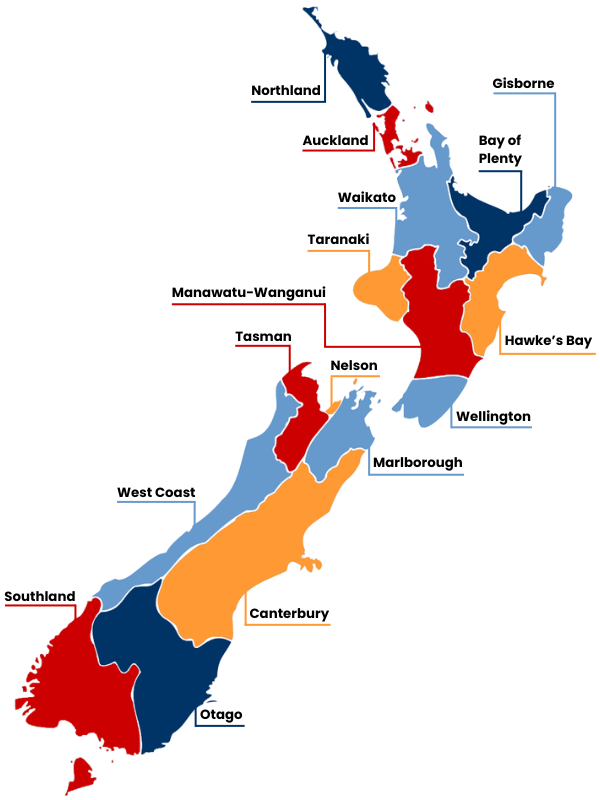
What percentage of New Zealand's population are immigrants?
Immigrants are
27.4% of New Zealand's population
Source: stats.govt.nz

New Zealand visa process: the complete lowdown
Obtaining a visa to live and work in New Zealand depends on your eligibility and factors such as nationality, family ties, the purpose of your visit, and length of stay. All visa, immigration, and residency matters are managed by Immigration New Zealand (INZ).
Australian nationals can move freely in and out of New Zealand, and citizens of many countries, including the UK, USA, Mexico, Taiwan (permanent residents only) and most European Union (EU) nations, do not need a visa for short stays of up to three months.
However, before arriving, you must apply for a New Zealand Electronic Travel Authority (NZeTA), which is valid for two years. Countries that require a visitor visa for short stays include China, India, Russia, Turkey and South Africa.
Processing times vary based on the type of visa, your location, and the volume of applications, especially during summer (November to March) when demand is higher.
How to move to New Zealand
To move to New Zealand, you must choose a long-stay visa that meets your needs and eligibility. The most common entry method to NZ is via a work visa, granted to those with specific experience, skills and education, and there are various ones to pick from:
- Accredited Employer Work Visa: for work with approved employers in a role of at least 30 hours a week. The length of stay is up to five years, and the application costs NZ$1,540* (around US$886).
- Skilled Migrant Category Resident Visa: for workers under 55 with in-demand skills. It also includes a pathway to residency and the ability to bring your partner and dependent children aged 24 and under. The length of stay is indefinite, and it costs NZ$6,450* (around US$3,713) to apply.
- Entrepreneur Work Visa: for business start-ups, requiring a detailed business plan and at least NZ$100,000* (around US$57,577) in investment capital. The length of stay is three years, and it costs NZ$12,380* (around US$7,128) to apply.
There are also several visas that allow you to study in New Zealand, including the following:
- Fee Paying Student Visa: for full-time students enrolled in approved education institutions. You can work part-time for up to 20 hours per week. The length of stay is as long as the course, up to four years, and it costs NZ$850 (around US$489) to apply.
- Pathway Student Visa: allows you to study up to three consecutive courses with different providers. You can work part-time for 20 hours or less per week. The maximum length of stay is 5 years, and it costs NZ$750 (around US$431) to apply.
- Exchange Student Visa: for international students participating in an approved student exchange programme. You can work part-time for up to 20 hours per week. The length of stay is up to 4 years, and it costs NZ$850 (around US$489) to apply.
Alternatively, relatives of New Zealand citizens can apply for a family visa. Popular options include:
- Partner of a New Zealander Resident Visa: obtain the right to live, work and study in New Zealand if your partner is a citizen or resident. The length of stay is indefinite, and it costs NZ$5,360* (around US$3,086) to apply.
- Partner of a Worker Work Visa: join your partner on a work visa, allowing you to work full-time and study for up to three months. The length of stay is the same as your partner's visa, and it costs NZ$1,630* (around US$938) to apply.
- Child of a Worker Visitor Visa: for children 19 years old and younger of parents on a working visa. They cannot work but can study for up to three months. The length of stay is as long as the parent's work visa, and it costs NZ$341* (around US$196) to apply.
Other options include a Working Holiday Visa for young people aged 18 to 30, an Investor Visa for those who can contribute significantly to New Zealand's economy, and a Post-Study Work Visa for international student graduates.
*prices accurate as of 2026

New Zealand visa application explained
To complete your New Zealand visa application, choose the visa most suited to your needs and apply online by following the below steps:
Prepare your documents: upload all relevant documents, ensuring they meet the specific requirements, including:
- A visa-compliant photo.
- Medical and police certificates in English.
- Any other supporting documents (dependent on the visa you're applying for) in English and certified copies of originals.
Create a RealMe account: most visa applications require a RealMe account (except for Working Holiday Visas and expressions of interest for Skilled Migrant Category Visas), a secure online identification service that provides access to the online visa application system.
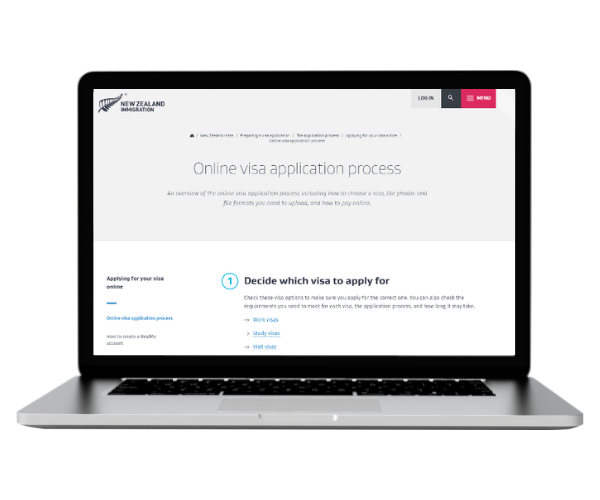
Complete your application: fill out your application online, including personal and housing details, purpose of visit, etc. Then, upload your documents, photos, and other supporting evidence, such as marriage and bank certificates, and pay the application fee using a credit card (Mastercard, Visa, or UnionPay).
Await your decision: INZ may contact you for additional information or clarification. Processing times vary based on the type of visa, your location, and the volume of applications, especially during summer (November to March) when demand is higher. If your visa is declined, you can usually appeal to the Immigration and Protection Tribunal within 42 days of your decision.
While online applications are preferred, you can download the relevant forms from the Immigration New Zealand website and send them by post or courier to the appropriate visa application centre. However, processing times are longer, and you will need to budget for additional fees to budget.
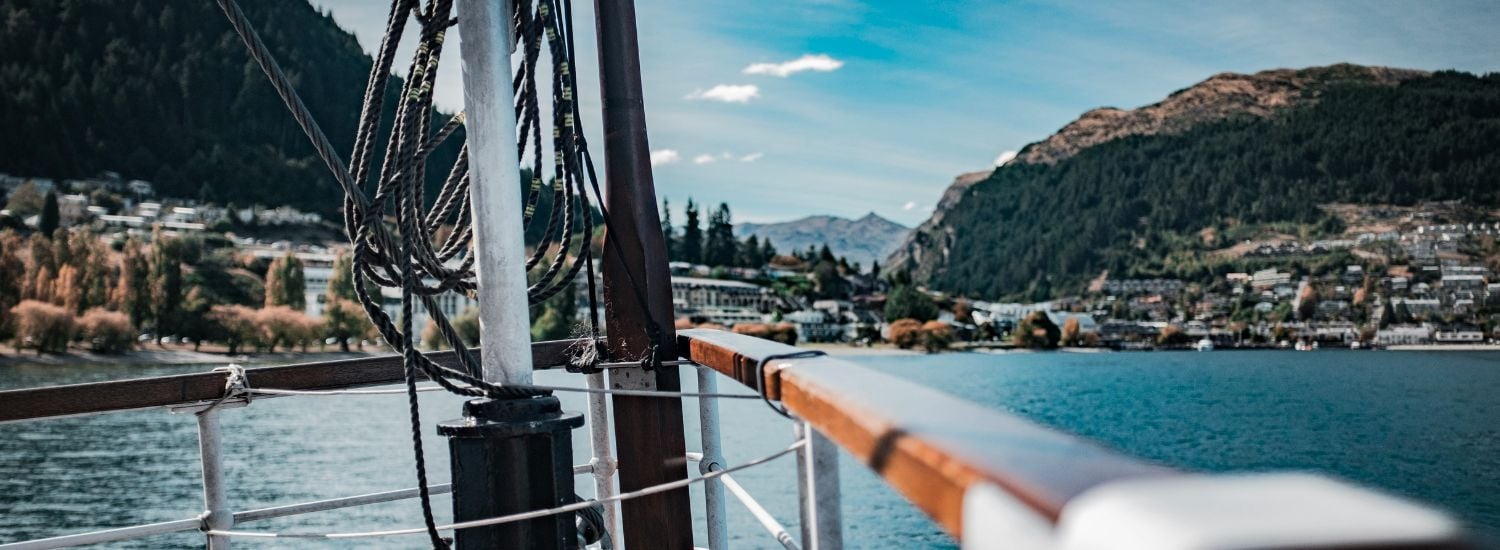
Cost of living in New Zealand
New Zealand offers expats an excellent standard of living. However, it comes at a relatively high cost, especially in cities like Auckland and Wellington. So, it's essential to budget well for housing, utilities, transport and food before your big move to the Land of the Long White Cloud.
How much does moving to New Zealand cost?
The money you'll need to move to New Zealand depends on your personal situation. However, typical costs include visa application and immigration fees, flights (use comparison tools like Google Flights and Skyscanner), temporary accommodation (utilise rental sites like Rentola and Trademe) and international removal costs.
Food prices in New Zealand are particularly costly due to the remote island's reliance on imports, high production costs, and a lack of supermarket competitors. For example, a standard weekly grocery shop for one person averages NZ$114 (around US$65) in Auckland and around NZ$89 (around US$51) in Hamilton.
However, housing will be your biggest expense. Popular Auckland suburbs like Parnell, Ponsonby and Mission Bay have among the highest rents in the country, as do several areas in Wellington and Queenstown. Average rents for a one-bedroom apartment in Auckland is roughly NZ$2,156 (around US$1,241) per month, while in Wellington, it's slightly higher at NZ$2,227 (around US$1,282).
Essential utilities, including electricity, water, and gas, cost between NZ$220 and 270 (around US$126 and 155) per month for a small apartment. Use comparison tools like Powerswitch and MoneyHub to find the best energy deals available.
On the plus side, healthcare is largely publicly funded, offering a good level of free or low-cost care, and public transport is reliable and cost-effective, with commuters in major cities spending around NZ$177 (roughly US$101) per month.
What is the minimum wage in New Zealand?
The minimum wage in New Zealand as of 2026 is:
NZ$23.50 per hour

Price of everyday items in New Zealand
Below are average prices* in New Zealand dollars (NZD$) for some everyday items and entertainment options:
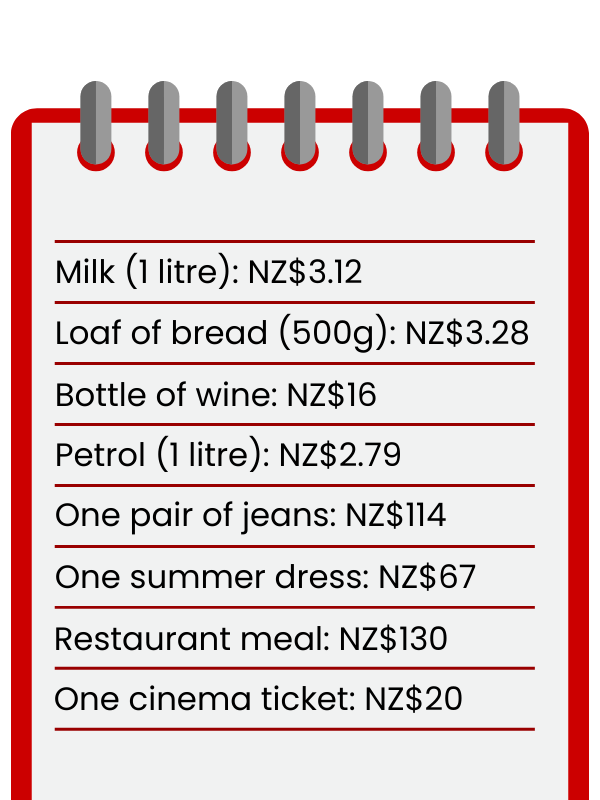
Can I retire in New Zealand?
Yes, you can retire in New Zealand, but it is costly, and you must meet specific visa requirements. Options include the Parent Retirement Resident Visa, which requires an investment of NZ$1,000,000 (around US$575,775), and the Temporary Retirement Visitor Visa, which requires an investment of NZ$750,000 (around US$431,831). Both visas also demand living expenses of NZ$500,000 (around US$287,887) and a stable income.
*prices accurate as of 2026
Required documents typically include ID (such as a passport or New Zealand ID), proof of residency, a visa, and a New Zealand Inland Revenue Department (IRD) (tax) number.

How to open a bank account in New Zealand
To open a bank account in New Zealand, visit local branches and research their offerings online, including customer reviews on sites like Trustpilot. Trusted nationwide banks include ANZ, ASB Bank, Bank of New Zealand (BNZ), Kiwibank, and Westpac.
Key features to look out for include fees for international transfers, account maintenance fees, digital banking and multi-currency accounts. Most New Zealand banks offer user-friendly online and mobile banking, which makes managing your account easy.
You can register with a bank online, but you'll likely need to visit a branch in person to activate your account. Required documents typically include ID (such as a passport or New Zealand ID), proof of residency, a visa, and a New Zealand Inland Revenue Department (IRD) (tax) number. If you don't have a New Zealand address yet, you may be able to use your overseas address temporarily.
Each bank offers a range of features, so use comparison websites like Money Compare and Money Saver to discover which institution best suits your financial situation.
Here are examples of some common bank accounts in New Zealand:
Everyday/transaction account: for daily use, such as salary deposits and bill payments. They usually come with a debit card, internet banking, and low or zero fees if specific criteria are met, such as a minimum monthly deposit.
Savings account: to help grow your savings, generally with higher interest rates than everyday accounts. Conditions may include limited withdrawals to qualify for higher interest rates and fixed-term savings.
Student account: tailored for students, such accounts often have no fees, no minimum balance requirements, and perks like fee-free overdrafts and low-fee foreign transactions.
Foreign currency account: ideal for those who travel frequently or wish to hold and transact in multiple currencies with reduced fees.
Cheapest place to live in New Zealand
The cheapest place to live in New Zealand is Whanganui, a small city known for its affordable housing and lower overall cost of living. Located on the North Island, Whanganui offers a more relaxed lifestyle compared to larger cities like Auckland and Wellington, with a scenic river setting and growing arts scene.
Other budget-friendly areas include Invercargill in the South Island and Gisborne, both of which offer cheaper rents, house prices, and daily living costs while providing easy access to natural beauty and outdoor adventures.
![]()
Types of property in New Zealand
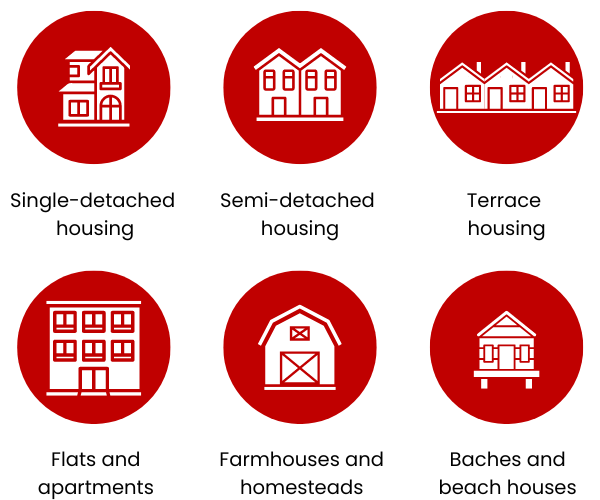
Single-detached housing: a standalone house that is not attached to any other dwelling, typically situated on its own section of land.
Semi-detached housing: a house that shares one common wall with another residence, but each has its own separate entrance and section of land.
Terrace housing: a row of connected houses sharing side walls with neighbouring properties, each with its own entrance and outdoor space.
Flats and apartments: self-contained units within a larger building or complex, where multiple dwellings are stacked or side-by-side, sharing common facilities like entrances or hallways.
Farmhouses and homesteads: rural dwellings typically located on agricultural land, serving as the principal residences for those managing or working on the farm.
Baches and beach houses: small and modest holiday homes located near the coast, typically used for weekend getaways and vacations.
Renting in New Zealand
Start by researching the areas you're most interested in while still in your home country to understand prices, transport, local amenities and crime rates. Rental comparison websites like Trade Me Property, Realestate.co.nz, and OneRoof provide detailed listings and prices. The cost of rent is advertised weekly as standard across the country. For more affordable options, look for properties managed by community housing providers, who offer rentals to eligible low-to-middle-income tenants at below-market rates.
You can directly contact landlords or go through property agents who act on behalf of landlords. Most properties are offered unfurnished, but there are a growing number of furnished properties available, especially in bigger cities like Wellington or Auckland.
Don't be tempted to accept somewhere based solely on an online listing. Visiting the property in person is essential to understanding its condition, layout, and neighbourhood. Ask the landlord or property manager detailed questions about the home, its building, the tenancy terms, and any other concerns you may have.
Once you find a property you like, you must complete an application with references from previous landlords — the more, the better! You'll also need proof of income and identification via your work visa and photographic ID. If you are yet to receive your first paycheck, a letter from your employer detailing your salary and contract length should suffice. Be prepared for credit and background checks as part of the process.
Top tip: if you have no rental history, you can use character references from an employer or someone of "good standing" unrelated to you.
Signing a tenancy agreement is a legal requirement in New Zealand. It outlines important details such as the agreed rent, the bond, tenancy duration, and rules regarding pets, subletting, and maintenance. Once signed, you'll make your first rent payment in advance, typically 1-2 weeks' rent worth, and a bond of 4 weeks' rent, lodged with Tenancy Services until the end of your tenancy.
There are two types of tenancy agreements:
- Fixed-term agreements: set for a specific period, usually at least six months.
- Periodic agreements: continues until the tenant or landlord gives notice to end it within an agreed amount of notice, usually 63 or 90 days for landlords and 21 days for tenants.
Before moving in, carefully inspect the property, documenting any existing damage with photos. The landlord should provide a condition report to compare the property's condition at the end of the tenancy.
Lastly, understand your rights and responsibilities under New Zealand's Residential Tenancies Act, designed to protect both tenants and landlords.
Buying a house in New Zealand as a foreigner
New Zealand has strict rules on who can and cannot purchase property. Non-residents, including those on temporary work or student visas, generally cannot buy existing residential homes. Exceptions include new-build properties in a large apartment complex or those with Overseas Investment Office (OIO) approval. OIO may approve permanent residents, long-term visa holders or investors who can demonstrate significant benefits to New Zealand, such as economic development or job creation.
Before researching the New Zealand property market, work out a budget to determine your home loan (mortgage) affordability. Be prepared for costs like the deposit (usually at least 30% of the property's value for non-residents) and additional taxes or duties. Foreign buyers in New Zealand are subject to a Residential Land Withholding Tax if classified as "offshore persons" who sell a property after a certain amount of time, generally five years. Further costs include Land Information Memorandum (LIM) reports and building inspections to determine the property's condition.
Visit as many homes as possible using popular websites like Trade Me Property and Homes.co.nz, and ask the estate agent detailed questions. Consider suitable local amenities, proximity to work and schools and transport options.
Securing a home loan as a foreigner can be a challenge. Most New Zealand banks require a good credit score and proof of income. Popular banks that work with foreign buyers include Australia and New Zealand Banking Group (ANZ), ASB Bank, and Westpac. Obtaining home loan pre-approval (an in-principal mortgage) is crucial to understand the maximum amount you can borrow and any special conditions that may apply.
Once you decide to make an offer and it's accepted, you'll need a conveyancing lawyer to manage legalities, ensure compliance with foreign ownership rules and more. Hiring building inspectors to assess the property's condition is essential in the wake of New Zealand's leaky building history.
Finally, pay the deposit and complete all necessary legal checks. Your conveyancing lawyer will ensure everything complies with New Zealand's property laws and complete the property transfer on settlement day.
Be prepared for costs like the deposit (usually at least 30% of the property's value for non-residents) and additional taxes or duties.

Is it hard to move to New Zealand?
Moving to New Zealand can be straightforward or challenging, depending on your nationality, work experience, education, family connections and whether you intend to work or study.
Another key consideration is how to transport your possessions to New Zealand. The easiest option is to hire an international removals company that can provide a self-loading container like the Seven Seas Worldwide MoveCube®.

Tailor your CV to fit the relatively laid-back Kiwi attitude by keeping it concise, highlighting relevant skills, and avoiding overly formal language.
How to get a job in New Zealand
Before searching for a job, you must understand your New Zealand visa requirements.
Conditions may include:
- Not being allowed to work,
- A limit on how many hours you can work,
- Being tied to one employer or location,
- Being tied to a specific sector or skill level,
- Limits on starting your own business.
The most common work visas include the Skilled Migrant Category Resident Visa for workers with in-demand skills. Ensure your qualifications are recognised in New Zealand, which is especially relevant in healthcare and education.
Focus your search on industries with strong demand. Thriving sectors in New Zealand include healthcare, construction, IT, education, and agriculture, plus growing sectors like renewable energy, film production, and tech start-ups. Job search sites like Seek, Trade Me and Indeed are fantastic resources for current available roles. Consider using a local recruitment agency like Hays or Randstad, which can offer specific insights into your field.
Tailor your CV to fit the relatively laid-back Kiwi attitude by keeping it concise, highlighting relevant skills, and avoiding overly formal language. Include a well-crafted cover letter that shows your understanding of the company and why you believe you're the ideal candidate for the role. Ensure your application reflects New Zealand's way of working: a positive attitude, open communication, teamwork and a healthy work-life balance.
Considering that an estimated 70% of jobs in New Zealand do not appear on job sites, networking is a vital chance to open new doors. Attend industry events, join LinkedIn groups relevant to your field or participate in community meet-ups.
Be prepared for a competitive job market, especially in highly populated cities like Auckland and Wellington. Be persistent, apply for as many roles as possible, and you'll undoubtedly land a job matching your skills and aspirations in no time!
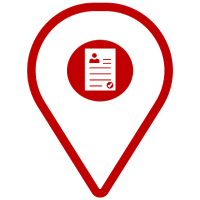
In-demand jobs in New Zealand
According to New Zealand Immigration's Green List, some of the most in-demand roles include construction project managers, ICT security specialists, software engineers, clinical psychologists, physiotherapists, paramedics, social workers, system administrators, registered nurses and secondary school teachers.
The graph below orders these roles by their expected average earnings in NZ$ and includes their corresponding ANZSCO code*.
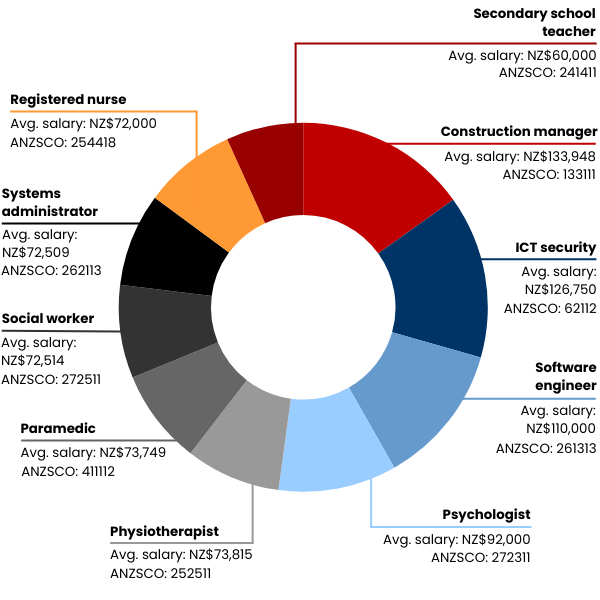
*An ANZSCO (Australian and New Zealand Standard Classification of Occupations) code is a classification system used to define and categorise jobs based on skill level.
It's important when applying for jobs in New Zealand, especially for immigration purposes, as it helps determine eligibility for certain work visas and whether your experience matches the position's requirements.

New Zealand history
Pre-1600s
Aotearoa was first settled by Polynesian navigators around 1300 AD, forming the Māori culture that developed into societies with distinct iwi (tribes) and hapū (sub-tribes).
Early 1800s
Dutch explorer Abel Tasman arrived in 1642, but it was not until British explorer James Cook's voyages in the late 18th century that regular European contact began.
Mid-1800s
In 1840, Māori chiefs and the British Crown signed the Treaty of Waitangi, establishing New Zealand as a British colony. It led to fierce disputes during which the Māori people lost vast amounts of land.
1900s
In the early 20th century, New Zealand participated in World Wars I and II, fostering a sense of national identity separate from the UK. Significant social and economic changes followed the war, including developing a welfare state.
Today
New Zealand became fully independent in 1947. Today, the country is known for its commitment to social equity, environmental responsibility, and honouring both Māori and non-Māori heritages.

New Zealand culture: values, traditions, food and more!
New Zealand's culture is a unique blend of traditional Māori heritage, European influences and the spirit of the South Pacific. Today's proud nation embodies respect for community, a love of the outdoors and a laid-back approach to life.
Here's what makes Kiwi culture remarkable:
- Māori heritage: Māori culture is vital to New Zealand's identity. Concepts like manaakitanga (hospitality) and kaitiakitanga (guardianship of the land) influence daily life. Respect for elders and community is central, reflected by both Māori and Pākehā (European New Zealander) peoples.
- Outdoor adventure: from hiking (the locals call it "tramping") to chill beach days and sports like rugby and cricket, Kiwis are known for their love of the great outdoors.
- Will my plugs still fit?: New Zealand uses type I plugs featuring two angled flat prongs and a grounding pin. The standard voltage is 230V, and the frequency is 50Hz. You can use plug adapters on arrival for your non-New Zealand devices; however, it's best to replace them as soon as possible, as adapters are considered a short-term solution unsafe for prolonged use.
- Dry humour: Kiwi humour is self-deprecating and often deadpan. It's a big part of everyday life and is frequently used to connect with others. New Zealanders love irony, sarcasm and gentle ribbing, as exemplified by world-conquering comedy music stars Flight of the Conchords.
- Cuisine with a local twist: New Zealand's culinary scene reflects its multicultural society and fresh local produce. Traditional Māori dishes like hangi (meat and vegetables cooked underground) coexist with modern favourites such as fish and chips and a growing coffee-loving café culture.
- Distinct Kiwi expressions: everyday language includes distinctive Kiwi sayings like "sweet as" (everything's good) and "jandals" (flip-flops). The use of Māori greetings like "kia ora" (hello) and "Haere mai" (welcome) is also common.
Fun facts about New Zealand
- Afraid of snakes? Book your flights now! New Zealand is one of the few places in the world without native snake species, and its strict biosecurity rules make it illegal to bring any into the country.
- New Zealand might look small compared to its Australian neighbour, but it's surprisingly large. Covering 103,483 square miles, it's 10% bigger than the United Kingdom. Despite its vast size, New Zealand only has around 5 million residents, in stark contrast to the UK's 67 million.
- Despite the much-loved nickname, the kiwi fruit isn't native to New Zealand. Originally known as the Chinese gooseberry, it was renamed after the kiwi bird in the 1950s by clever marketers who wanted a more local name.
- New Zealand is home to around 25 million sheep, making it one of the most sheep-populated countries on the planet. With a sheep-to-human ratio of five to one, we'd be hopelessly outnumbered if sheep ever decided to stage an uprising!
- Baldwin Street in Dunedin holds the Guinness World Record as the steepest street, with a gradient of 34.8%. Visitors challenge themselves to walk or run up the popular tourist attraction. Events like the annual Jaffa race, where people roll thousands of chocolate candies down the hill, add to its quirky charm.
- Auckland is affectionately known as the City of Sails. With 135,000 boats and yachts per capita, it has the highest number of private ships in the world. Both city harbours are forever dotted with sails, reflecting the local passion for sailing and water sports.
- The Māori language, once at risk of fading away, has made a powerful comeback. Te Reo Māori is increasingly woven into official signs, government communication, media reporting and education, reflecting a national effort to revitalise the language.
- Hobbiton, the movie set built for The Lord of the Rings trilogies, has become a significant tourist attraction. It offers visitors a chance to enter Middle-earth's fictional world, complete with hobbit holes, the Green Dragon Inn, and pastoral landscapes.
- The small Kiwi town of Kawakawa is famous for its colourful public toilets designed by Austrian artist Friedensreich Hundertwasser. The restrooms, complete with vibrant mosaics, glass bottles and quirky sculptures, have become one of the most celebrated attractions in New Zealand.
- In 1989, the small town of Whangamomona, frustrated with local government changes, declared itself a republic. Independence is celebrated every two years with a Republic Day festival, including passport stamps and a line-up of eccentric presidential candidates.
New Zealand is home to around 25 million sheep, making it one of the most sheep-populated countries on the planet.
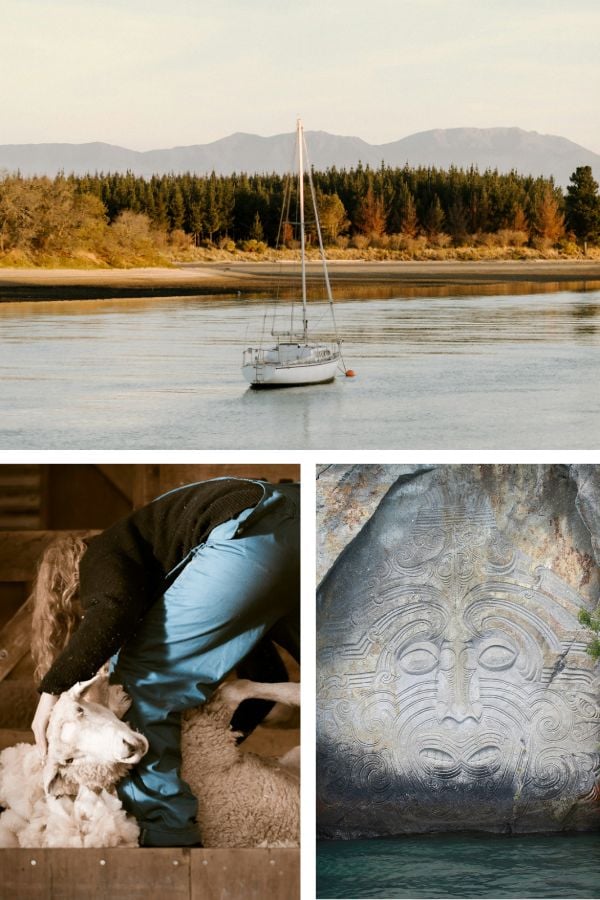
FAQs about moving to New Zealand
To apply for a New Zealand visa, research the most applicable option on the Immigration New Zealand (INZ) to understand your eligibility and which documents you'll need. The most common visas are work, study or family-related.
Approval for New Zealand visas depends on your visa type. Visitor visas take a few days to several weeks, work visas around six to ten weeks, student visas up to ten weeks and resident visas from a week to ten months. Processing times may vary due to factors like the accuracy of your application, any additional checks and busy periods, especially in New Zealand's summer months (November to March).
Your New Zealand visa's validity period depends on its type. Before applying, thoroughly review the rules and requirements of your desired visa.
Visit the government's Immigration New Zealand (INZ) website for the most up-to-date information.
The best place to live in New Zealand varies based on your lifestyle, family size and budget. Auckland offers suburban living, high-rise apartments and coastal homes. The capital, Wellington, is a blend of big city vibes with easy access to nature and includes charming hillside neighbourhoods like Thorndon and Miramar. Christchurch is notable for its post-earthquake redevelopment, blending new urban spaces with historical landmarks. Finally, Queenstown is a tourist hotspot known for outdoor adventure, upscale lakeside homes and breathtaking mountain landscapes.
Living in New Zealand offers beautiful natural surroundings, welcoming people and a relaxed lifestyle. The country is famous for its varied outdoor activities, with quick access to beaches, mountains and parks. Residents enjoy a safe country to call home, robust education system and accessible healthcare.
You can move to New Zealand without a job if one of the following applies:
- you're joining eligible family members, such as those on long-term work visas,
- you're studying,
- you're visiting for up to nine months,
- you can make a significant investment to New Zealand's economy.
You can import pets to New Zealand, but they must meet strict requirements, including quarantine, veterinary checks and specific import permits. Certain dog breeds, like Brazilian Filas and Japanese Tosa, are prohibited. Processing can take at least 30 working days.
For the latest information, consult the New Zealand Ministry for Primary Industries website.

What is the MoveCube®?
You can ship all your household and personal possessions inside our robust moving pod, the MoveCube®. It acts as your own dedicated container, which we'll bring to your door for you to fill with sofas, kitchen appliances, bikes, sporting equipment, musical instruments, boxes, bags and more!
Each MoveCube® order includes a free Starter Pack. Inside, you'll find a marker pen, a box cutter, a roll of parcel tape and a tape dispenser to help secure your stuff. Plus, three plastic floor sheets to estimate what fits inside a Large, Medium or Small MoveCube®.
You can order multiple MoveCubes®; however, they may arrive on separate days. Grab an instant free quote now for a transparent cost breakdown of the entire overseas shipping to New Zealand process.
Another benefit of choosing our overseas removers is that we handle the customs process in New Zealand for you. However, there are a few things to keep in mind before packing your boxes and moving household items to New Zealand.
- Like all nations, New Zealand has restrictions on specific items to protect its people and environment. Check out our Prohibited Goods page before packing to avoid delays or fines.
- Log into your Seven Seas Worldwide account to complete your online documents and ensure your inventory (a detailed packing list of everything you're shipping) matches precisely what's in the MoveCube(s)®.
- Upload clear, colour scans of the shipment owner's passport picture and signature pages.
- If you're shipping any wood, plantlife or animal by-product and their derivatives, ensure they are not classified as endangered by CITES (Convention on International Trade in Endangered Species of Wild Fauna and Flora).
All new immigrants and returning citizens must complete a customs declaration form NZCS 218 to ship unaccompanied household effects into New Zealand. You may qualify for a concession if you meet specific criteria. Otherwise, you'll pay 15% GST on the total value of your items.
Qualifying criteria include:
- You must arrive in New Zealand before your effects,
- You can prove your New Zealand residence (e.g., with a New Zealand passport, a valid residence visa or residence permit, a valid work visa or work permit, or a valid visitor visa),
- You have lived outside New Zealand for at least 21 months before your arrival,
- You have owned and used all the items in your shipment,
- You do not plan to sell, gift, exchange or dispose of your items once in the country.
If you import your belongings five years after your arrival, concessions are at the discretion of New Zealand customs officers.
Our friendly, multilingual customer service team can answer any customs or removal-related questions.
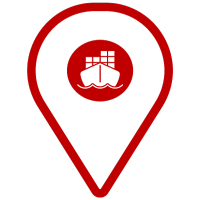
2026 transit times for shipping to New Zealand
The following are estimated shipping times when moving one Large MoveCube® by sea from the capital cities of some of our most popular routes to Wellington, New Zealand in 2026.
| Origin country | Transit time* |
| Australia | 64 days |
| China | 73 days |
| Hong Kong | 67 days |
| Ireland | 151 days |
| Malaysia | 89 days |
| Netherlands | 138 days |
| South Africa | 114 days |
|
Thailand |
104 days |
| United Kingdom | 117 days |
| United States | 160 days |
*estimated timings dependent on global shipping circumstances.






